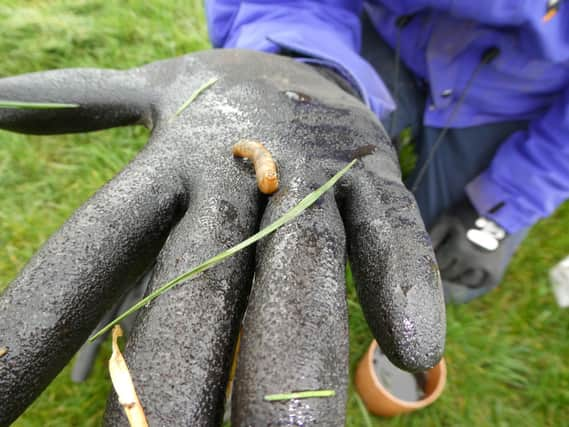Leatherjacket mitigation resources available


A full report detailing the project and it’s findings is now available on the AgriSearch website alongside a number of other resources including webinar recordings on the topic of leatherjackets and their control as well as instructions on a simple method to determine if you have leatherjackets present on farm and the scale of any infestation.
The Leatherjacket Mitigation Strategies EIP project was led by AgriSearch and comprised of four farmers from County Fermanagh alongside research partners within the Agri-Food and Biosciences Institute (AFBI). Following concerns raised by farmers in the west of the province, the project aimed to investigate the extent of the leatherjacket problem in Fermanagh and determine integrated pest management strategies to mitigate against leatherjacket infestation.
Advertisement
Advertisement
The EIP project was jointly funded by the European Agricultural Fund for Rural Development (EAFRD) and the Department of Agriculture, Environmental and Rural Affairs (DAERA).
The results of an online survey carried out as part of the project found the original concerns raised by farmers to be justified with 67% of respondents (the majority in Fermanagh and Tyrone) to have experienced leatherjacket presence in grassland with 74% of those experiencing associated reductions in grass growth and availability on farm. With chemical control measures no longer available there was a clear need to identify and communicate measures which could mitigate infestation risk.
Review of the literature, ongoing discussions within the EIP operational group members and farmer feedback from webinars and events enabled the construction of an integrated pest management (IPM) strategy. This strategy is based on a long-term multi-season management approach, quite different from reactive insecticide application. IPM seeks to incrementally reduce leatherjacket populations through a series of complementary measures. Most of the IPM recommendations made as a result of the project are good grass husbandry, and include drainage, liming, regular reseeding, and regular monitoring of fields to detect potential leatherjacket problems at an early stage.
In undertaking this project, the Leatherjacket Mitigation Strategies Operational Group has raised the profile of leatherjackets and their impact in Northern Ireland, highlighted the knowledge gap that has existed since the removal of chemical control methods from the market and taken the first steps in providing famers with simple actions that can be undertaken on farm to both understand current leatherjacket problems and mitigate against the risk of an economically damaging infestation.